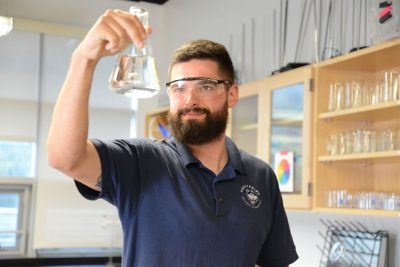
In our recurring 10 Questions series, the Neag School catches up with students, alumni, faculty, and others throughout the year to offer a glimpse into their Neag School experience and their current career, research, or community activities.
Michael Fenn ’19 (CLAS), ’21 MA, a native of East Lyme, Connecticut, grew up around many family members who served as teachers, including his father, grandmother, mother, and two of his sisters. After completing his undergraduate degree in general science at UConn in 2019, Fenn went on to earn his master’s degree in curriculum and instruction through the 11-month Teacher Certification Program for College Graduates (TCPCG) at the Neag School of Education. He is now a middle school science teacher for Manchester (Connecticut) Public Schools.
Q: Why did you want to be a teacher?
A: I have known I wanted to be a teacher since I was in high school. So many members of my own family have made careers out of education. I was always surrounded by the lifestyle and found it appealing. Because of this upbringing, I believe I saw the value of education and all the doors it could open, so early on, I committed myself to become a lifelong learner. As a teacher, I want to inspire students to value education and see the benefits of remaining active learners even outside the classroom.
Q: What originally inspired you to become a teacher, and what kind of teacher do you think you will be?
A: One of my biggest inspirations was my grandmother, a high school Spanish and Latin teacher [for] 35 years. I can remember when I was young, probably a freshman in high school, having a conversation with her about school. She made me realize that education is a tool, and the application of the skills you learn in school … the more you know, the more doors and opportunities open up to you. I want to be like Robin Williams in “Dead Poets Society.”
“As a teacher, I want to inspire students to value education and see the benefits of remaining active learners even outside the classroom.”
–Michael Fenn ’19 (CLAS), ’21 MA
Q: Why did you select the Neag School of Education to help you become a teacher?
A: Primarily because of the program’s reputation for creating solid teachers, but also because the School offered an accelerated master’s and certification program through the TCPCG program that had a branch close to my home.
Q: How did TCPCG prepare you for the classroom?
A: All of the professors and teachers throughout the program were current classroom teachers or building administrators, so a great deal of what I learned was highly relevant to the current atmosphere of public schools.
Q: What Neag School professors stood out for you and why?
A: Professor John Settlage stood out for me. He wore many different hats throughout the program. As a professor, he kept the material real and relevant to the current climate of education. As an advisor, he was thoughtful and attentive to everyone’s needs, and most importantly, he advocated for all the members of the cohort and is an all-around down-to-earth person.
Q: What are your plans on getting your classroom ready for the fall?
A: Hopefully, I can create an environment that is comfortable and conducive for learning!
Q: How do you plan on making science interesting and cool for your students?
A: I think the best way to make science fun and interesting is to be as hands-on as possible, so students can get realistic experience using different science practices, and even if they never go on a career in science, hopefully, they remember that time they had fun in my class!
Q: Why is science an important subject matter for today’s students?
A: Today, where so many people’s lives are impacted by science and technology, few people can understand and make sense of the world of science. So now more than ever, there is a need for scientifically literate people, capable of taking, processing, and interpreting the world around us in a meaningful and productive way.
Q: What do you think makes for being a great teacher?
A: All teachers should have dozens of different skills, but one of the most important things is simply patience. Having the capacity to take the time needed to help all students equally and adequately is a daunting task that merely requires taking the time to meet students where they are and bring them to the next level.
Q: Where do you see yourself professionally in the next few years?
A: Eventually, I would like to get involved in the administrative aspect of education and become a principal and maybe even a superintendent of schools. I’ve even thought about going for my Ph.D., so I could someday teach teachers how to teach!
Read other installments of the 10 Questions series.
If you have a college degree and would like to explore the possibility of becoming a teacher in less than one year, be sure to attend an upcoming information session for the Teacher Certification Program for College Graduates. Learn more at s.uconn.edu/teach.
 Facebook
Facebook
 Twitter
Twitter
 LinkedIn
LinkedIn
